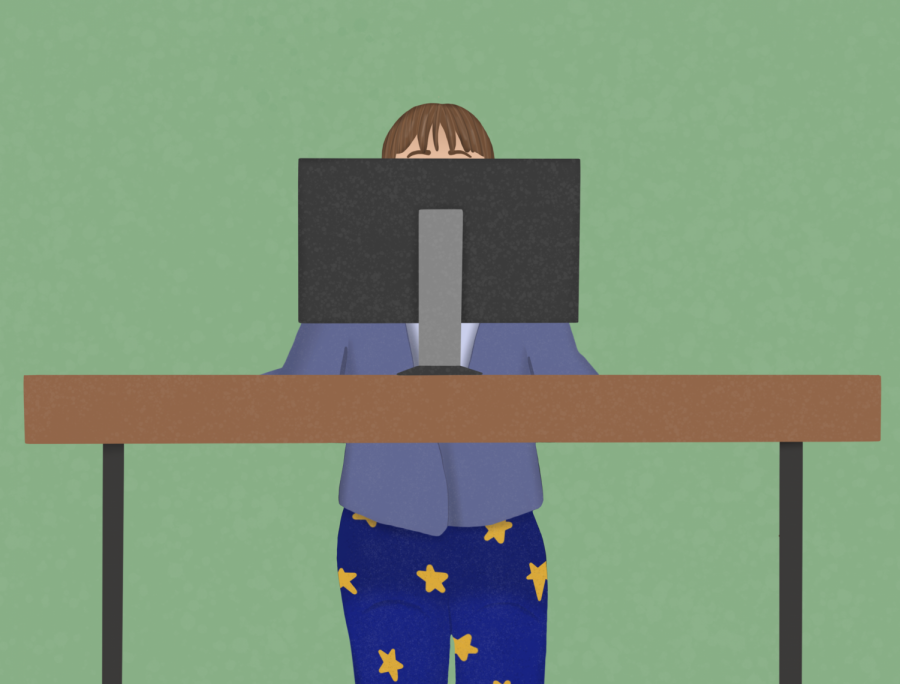University graduates struggle transitioning into the workforce
February 4, 2021
After graduation, new alumni find themselves typically choosing one of three options: find a job and start working, go to graduate school or take a gap year. This year’s graduates have extra considerations, attempting to factor in the impact of the pandemic.
With businesses and organizations closing, downsizing and changing, many new graduates had to learn how to acclimate to unique circumstances in the workforce. They had to embark on the beginning of their careers in a way that has never been experienced before.
Jessica Gruen, LAS graduate from Dec. 2020, mentioned how the pandemic caused her to feel nervous about what would happen for her after school had ended.
“I felt very nervous. One of my older sisters graduated back in the recession around 2011 which was a bad job market, and the job market I was applying into was even worse so that just felt really bad at the time,” Gruen said.
She said that due to the condition of the job market that she wasn’t sure of whether or not she would find something to do after graduation.
Get The Daily Illini in your inbox!
However, as a Molecular and Cellular Biology and Psychology major, Gruen felt excited for the opportunities that were growing in the medical field. While still deciding whether or not to apply to medical school, she said she felt hopeful that the pharmaceutical and biotech industries will be booming in response to how COVID-19 has impacted them and is inspired by how many people are beginning to notice the industries’ importance in our world.
As graduates acclimate to an entirely online application and interview, the need to become creative and explorative has increased. Without being able to attend in-person career fairs, networking events and interviews, it is hard for graduates in the time of COVID-19 to get a grasp on how to form connections with the companies and organizations they wish to work with.
Utilizing apps such as LinkedIn and Handshake are helpful, yet they do not enable the personal connections and relationships that can make a big difference in the interview process.
Alexa Heitzman, graduate of the College of Media, stated that she found a unique way to stand out from other applicants as she began looking for employment by cold-calling companies she was interested in. By showing initiative, she said that interviewers and recruiters expressed how they felt impressed with her method.
Additionally, upon accepting a position as a project coordinator at a startup firm, she emphasizes the importance of personal connections.
“Even one of my jobs now as a project coordinator required me to hire somebody else. I put up an application on LinkedIn and within an hour we got like 50 applications. The person we ended up hiring was actually someone who reached out to me,” Heitzman said. “Even if you’re going for a big job, just reach out to the recruiter and can get any sort of connection to get you the next level.”
In addition to altering the way graduates go about finding jobs, COVID-19 also endangered many students’ aspirations to find work in different states or countries. With the many restrictions on travel keeping people at home, many graduates had to change their plans of applying elsewhere and focus on finding employment closer to them. Moving around the country, changing locations and working in an unfamiliar place was not as easy as it had been in the past.
Steph Maurer, College of Media graduate, hoped to find a job in New York after graduating.
“My dream is to work in New York, and I had all of these applications open, Maurer said. “I had a couple of interviews that were going pretty well in New York, but I knew that even if I were to get the jobs, especially as April passed and the COVID-19 situation wasn’t improving, that I really needed to extend outwards and completely change my strategy to start looking for jobs in Chicago.”
Maurer missed out on opportunities she was hoping to experience, yet she said that in the end, her job taught her that your first year looking for a job doesn’t have to be perfect. She emphasized how upcoming graduates should own the fact that they were able to conquer going to college throughout a pandemic, which is an achievement not many have in their repertoire.
COVID-19 graduates are not alone in their struggle to navigate the beginnings of their future careers and should be proud of how far they have come. Maurer advised graduates to remember that, “It is a really really big world and there will be a job for you out there, but it might not be what you expect.”







